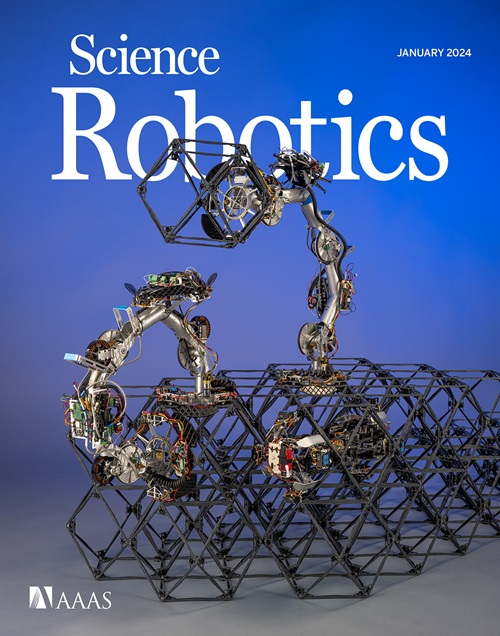Transforming science labs into automated factories of discovery
IF 27.5
1区 计算机科学
Q1 ROBOTICS
引用次数: 0
Abstract
Laboratories in chemistry, biochemistry, and materials science are at the leading edge of technology, discovering molecules and materials to unlock capabilities in energy, catalysis, biotechnology, sustainability, electronics, and more. Yet, most modern laboratories resemble factories from generations past, with a large reliance on humans manually performing synthesis and characterization tasks. Robotics and automation can enable scientific experiments to be conducted faster, more safely, more accurately, and with greater reproducibility, allowing scientists to tackle large societal problems in domains such as health and energy on a shorter timescale. We define five levels of laboratory automation, from laboratory assistance to full automation. We also introduce robotics research challenges that arise when increasing levels of automation and when increasing the generality of tasks within the laboratory. Robots are poised to transform science labs into automated factories of discovery that accelerate scientific progress.将科学实验室改造成自动化发现工厂
化学、生物化学和材料科学实验室处于技术的前沿,它们发现的分子和材料能够开启能源、催化、生物技术、可持续发展、电子等领域的能力。然而,大多数现代实验室与过去的工厂相似,主要依靠人类手动完成合成和表征任务。机器人技术和自动化可使科学实验更快、更安全、更准确地进行,并具有更高的可重复性,从而使科学家能够在更短的时间内解决健康和能源等领域的重大社会问题。我们定义了实验室自动化的五个级别,从实验室辅助到完全自动化。我们还介绍了在提高自动化水平和增加实验室内任务的通用性时出现的机器人研究挑战。机器人有望将科学实验室转变为加速科学进步的自动化发现工厂。
本文章由计算机程序翻译,如有差异,请以英文原文为准。
求助全文
约1分钟内获得全文
求助全文
来源期刊

Science Robotics
Mathematics-Control and Optimization
CiteScore
30.60
自引率
2.80%
发文量
83
期刊介绍:
Science Robotics publishes original, peer-reviewed, science- or engineering-based research articles that advance the field of robotics. The journal also features editor-commissioned Reviews. An international team of academic editors holds Science Robotics articles to the same high-quality standard that is the hallmark of the Science family of journals.
Sub-topics include: actuators, advanced materials, artificial Intelligence, autonomous vehicles, bio-inspired design, exoskeletons, fabrication, field robotics, human-robot interaction, humanoids, industrial robotics, kinematics, machine learning, material science, medical technology, motion planning and control, micro- and nano-robotics, multi-robot control, sensors, service robotics, social and ethical issues, soft robotics, and space, planetary and undersea exploration.
 求助内容:
求助内容: 应助结果提醒方式:
应助结果提醒方式:


